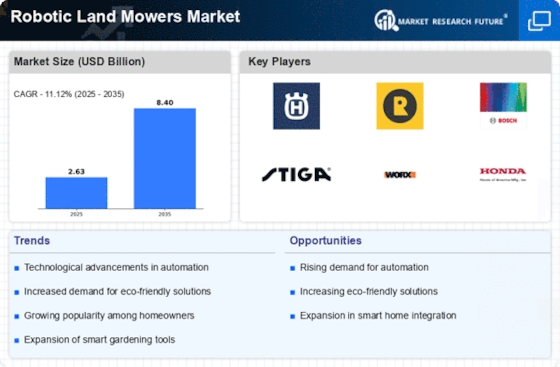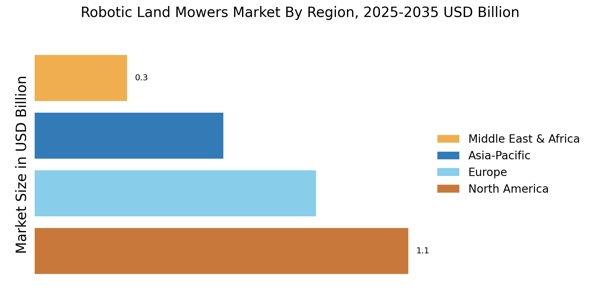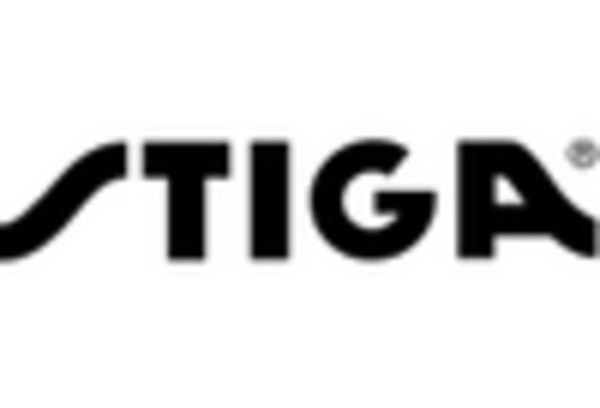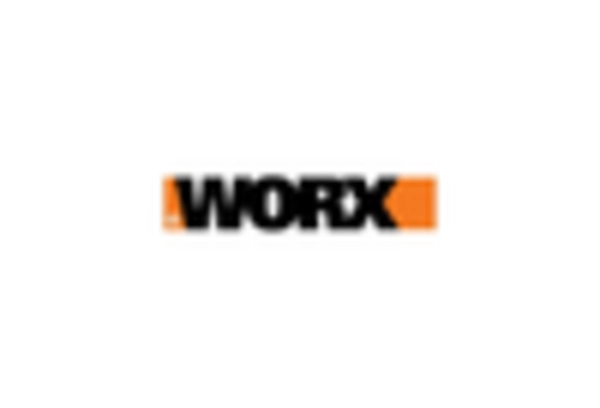Labor Shortages
Labor shortages in the landscaping and lawn care sectors are emerging as a critical driver for the Robotic Land Mowers Market. As the workforce becomes increasingly scarce, particularly in regions with high employment rates, businesses are seeking automated solutions to maintain their operations. Robotic mowers offer a viable alternative, allowing companies to reduce reliance on manual labor while maintaining service quality. The market is witnessing a shift as both residential and commercial users recognize the potential of robotic mowers to fill labor gaps. Data suggests that the adoption of robotic mowers could increase by 30% in the next few years as businesses look to automate their lawn care processes. This trend not only addresses labor shortages but also enhances operational efficiency, positioning the Robotic Land Mowers Market for robust growth.
Consumer Convenience
Consumer convenience is a driving force in the Robotic Land Mowers Market, as modern lifestyles increasingly demand time-saving solutions. Robotic mowers provide an automated approach to lawn care, allowing users to program mowing schedules and enjoy a well-maintained lawn without the need for manual effort. This convenience appeals particularly to busy professionals and families who may lack the time or inclination to engage in traditional lawn maintenance. Market Research Future indicates that nearly 60% of consumers are willing to invest in robotic mowers for the sake of convenience and efficiency. Furthermore, the integration of smart technology enables users to control their mowers remotely via smartphone applications, enhancing the user experience. As consumer preferences continue to evolve towards automation and ease of use, the Robotic Land Mowers Market is likely to experience sustained growth.
Sustainability Focus
The growing emphasis on sustainability is a pivotal driver in the Robotic Land Mowers Market. Consumers are increasingly aware of the environmental impact of traditional lawn care methods, which often involve gas-powered mowers that emit harmful pollutants. Robotic mowers, typically powered by electricity, offer a cleaner alternative, aligning with the global shift towards eco-friendly practices. Data indicates that the adoption of electric mowers can reduce carbon emissions by up to 50% compared to their gas counterparts. Additionally, many robotic mowers are designed to operate quietly, minimizing noise pollution in residential areas. This focus on sustainability not only appeals to environmentally conscious consumers but also encourages manufacturers to innovate and develop more energy-efficient models. Consequently, the Robotic Land Mowers Market is likely to see a rise in demand as consumers prioritize sustainable solutions for lawn maintenance.
Technological Advancements
The Robotic Land Mowers Market is experiencing a surge in technological advancements that enhance the efficiency and functionality of these devices. Innovations such as GPS navigation, artificial intelligence, and machine learning are being integrated into robotic mowers, allowing for precise cutting patterns and improved battery life. According to recent data, the market for robotic mowers is projected to grow at a compound annual growth rate of approximately 15% over the next five years. This growth is driven by the increasing demand for automation in lawn care, as consumers seek to reduce manual labor and improve the quality of their lawns. Furthermore, advancements in sensor technology enable these mowers to detect obstacles and navigate complex terrains, making them more user-friendly and effective. As a result, the Robotic Land Mowers Market is poised for significant expansion.
Urbanization and Space Constraints
Urbanization is a significant factor influencing the Robotic Land Mowers Market. As more individuals move to urban areas, the demand for efficient lawn care solutions increases, particularly in smaller residential spaces. Robotic mowers are particularly well-suited for urban environments, where traditional mowers may be impractical due to limited space and noise restrictions. The trend towards smaller yards and gardens necessitates a shift in lawn care practices, and robotic mowers provide a convenient solution that requires minimal human intervention. Market analysis suggests that urban areas are expected to see a 20% increase in the adoption of robotic mowers over the next few years, driven by the need for efficient and effective lawn maintenance. This urban-centric demand is reshaping the Robotic Land Mowers Market, pushing manufacturers to tailor their products to meet the unique needs of city dwellers.

















